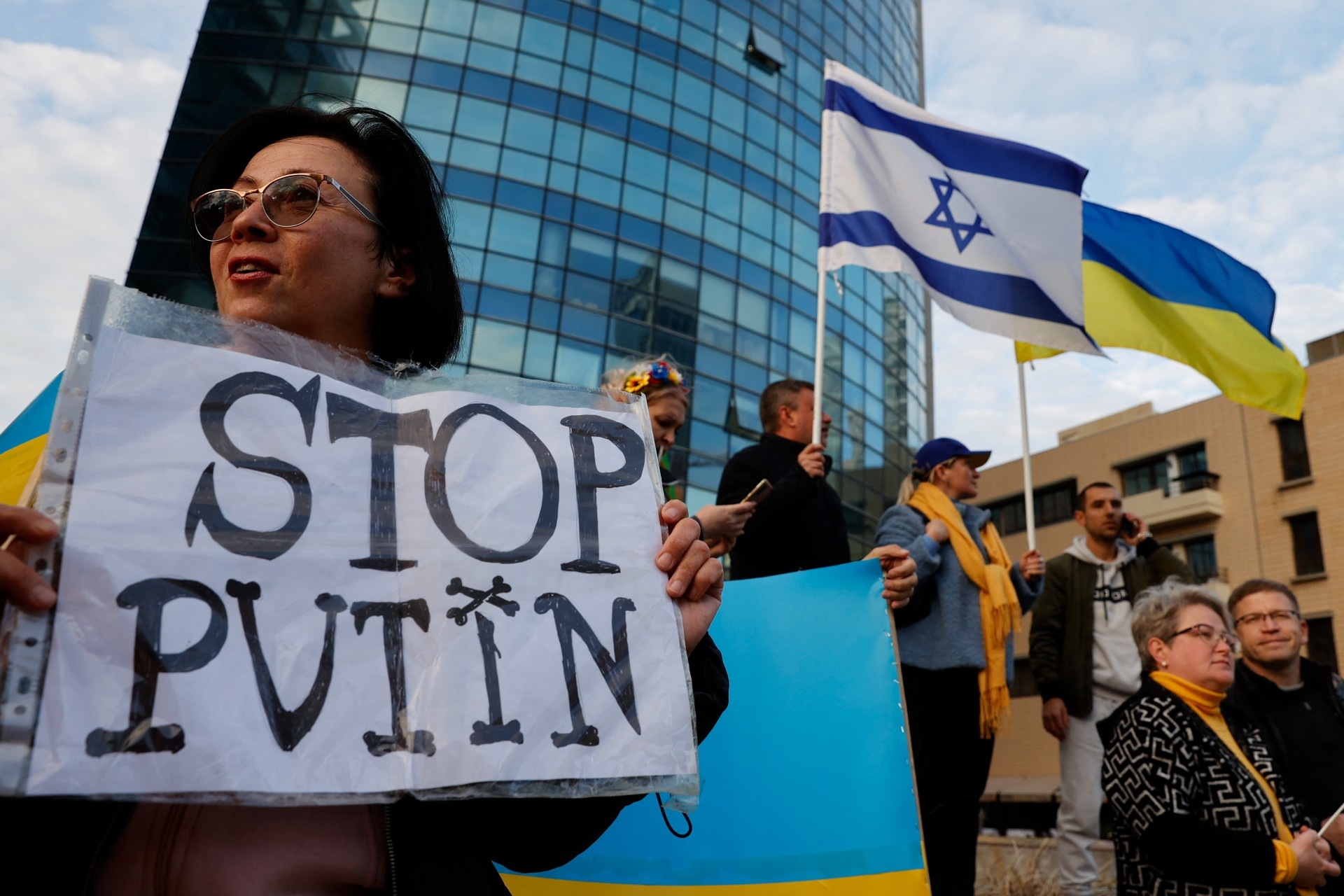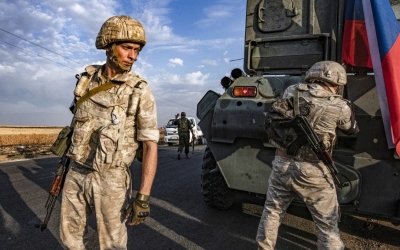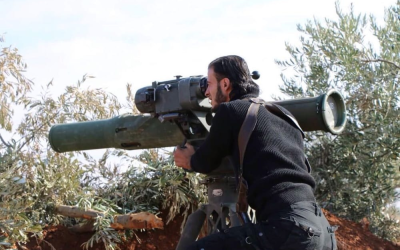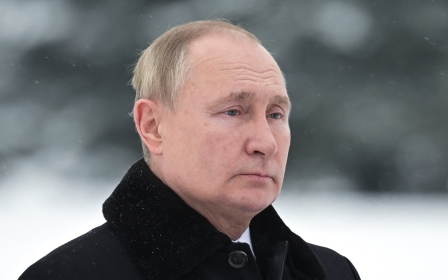Russia-Ukraine war: Israel’s ties with the West strained by its fear of Putin in Syria

When it comes to Ukraine, Israel is proving that some addictive habits are impossible to kick.
For years, Israel has flirted with Vladimir Putin’s Russia, cultivating very close relations while maintaining its strategic alliance with its most important benefactor: the United States.
Now Israel finds itself squeezed between contradictory global interests and attitudes, hesitating to make a clear choice.
In a last attempt to avoid coming down one way or another, as the vast majority of world opinion rallies behind the Ukrainian cause, Israel has tried to depict itself as an honest broker between Moscow and Kyiv, claiming that it has special interests and unique needs. Who doesn't?
Over the weekend, Israeli Prime Minister Naftali Bennett called both his Ukrainian counterpart Volodymyr Zelensky and Putin. But it was a charade. Bennet knew very well that there was no need for him to be the go-between, since Putin is not interested in any reasonable solution to end the war. Only Ukraine’s full surrender will satisfy him.
New MEE newsletter: Jerusalem Dispatch
Sign up to get the latest insights and analysis on Israel-Palestine, alongside Turkey Unpacked and other MEE newsletters
The Israeli military-security and diplomatic establishment is scared that if the country joins the world in condemning Russian aggression and follows the West in imposing sanctions on Russia's companies, banks and oligarchs, it will bring upon itself Putin's wrath in Syria and beyond.
Since Russia intervened in Syria in 2015 to save Bashar al-Assad’s government, Moscow has played a double game. On one hand, Putin's army cooperated with Iran's Revolutionary Guard and allied Shia militias to defeat rebel factions and to some extent the Islamic State group.
On the other hand, Russia turned a blind eye to the more than 1,000 Israeli air force strikes against Iranian and Hezbollah targets in Syria. In some cases, as collateral damage, Syrian troops were killed and their equipment destroyed.
Yet Putin has stopped the Syrian army from using S-300 air defence batteries against Israeli jets, systems that Moscow itself sold to Damascus. Furthermore, Russian forces stationed in Syria are protected by the more advanced S-400s, which have remained dormant as Israeli jets have struck Russia’s partners on the ground.
It is believed these air defence systems, if activated, would significantly reduce Israel’s freedom of action.
Israeli security sources told Middle East Eye that, on a few occasions, Russia even encouraged Israel to strike the Iranians hard when Moscow felt Tehran's presence and influence in Syria had become too deeply rooted.
Once-proud ties
The architect of the cosy, even personal, relations with Putin was former Prime Minister Benjamin Netanyahu. He repeatedly met with the Russian leader over the last decade, with Putin occasionally visiting Jerusalem.
Netanyahu was receptive to Putin’s requests to give Russia properties belonging to the Russian Orthodox Church, such as churches and monasteries, whose ownership was complicated by the Russian revolution and religious schisms.
Putin was not the only right-wing nationalist and populist leader Netanyahu allied himself with. The Likud leader also crafted close ties with Donald Trump, Brazil’s Jair Bolsonaro, Hungary's Victor Orban and Mateusz Morawiecki of Poland.
During the four election campaigns he fought from 2019 to 2021, Netanyahu proudly displayed huge posters of himself in the company of Putin, with the caption "different league".
Undoubtedly, Putin will be angry if Israel imposes sanctions on Russia. And he may even respond with efforts to limit Israeli military action in Syria.
But the surprising and unexpectedly slow Russian military onslaught in Ukraine exposes the weakness of Putin and his armed forces. Putin is not omnipotent, as many pundits tended to believe.
Focus on Iran
Indeed, one can argue that while Israel needs Putin for its continued operations against Iran in Syria, the Russian leader needs Israel too.
The relationship between Israel and Russia after the Ukrainian war will not be a zero-sum game.
Putin's wins won't necessarily mean Israeli losses. The same analysis applies to the quadrangular Israel-US-Iran-Russia relationship.
Conventional wisdom says that the war in Europe inadvertently helps Iran with its aspirations of expanding its regional hegemony in Lebanon, Syria, Iraq, and Yemen, and for consolidating its nuclear programme.
It is also argued that since the US focus is now on the war, a return to the 2015 JCPOA nuclear deal with the world powers is slipping away.
However, this is a simplistic and superficial picture. The reality is much more complex. It is above all in the Iranian interest to return to the negotiating table in Vienna and sign the deal.
Iran's main, and probably sole reason to do so is because of the sanctions, which have been hurting it since 2018, when Trump withdrew from the JCPOA and reimposed them.
The surprisingly strong and determined American, Nato, EU and UK reaction to the Russian aggression must be a source of concern for Iranian leaders.
In the absence of a deal, Iran's economy will further deteriorate, and the world may decide that, as with Russia, harsher sanctions are the way to go.
Nevertheless, with or without a nuclear deal, and even with the potential of Putin's reprisals, time is running out for Israeli leaders.
Sooner rather than later they must get off the fence. Already the US is showing its impatience with the delaying tactics used by Israel.
Notably, US Ambassador to the UN Linda Thomas-Greenfield expressed her displeasure when Israel refused to be among the sponsors of a draft resolution condemning Russia in the General Assembly.
The US Treasury has also warned Israel not to help Russian oligarchs – many of whom took Israeli nationality as a security policy for rainy days – launder money in Israeli banks, which in the past have practically served as tax havens.
With all the difficulties and juggling, Israel can't avoid the strategic choice it made decades ago: its chips have always been on the American side of the roulette table.
For most Israelis, and eventually its leaders, the decision to be made between Putin's rage and Biden's fury is clear.
Middle East Eye delivers independent and unrivalled coverage and analysis of the Middle East, North Africa and beyond. To learn more about republishing this content and the associated fees, please fill out this form. More about MEE can be found here.







